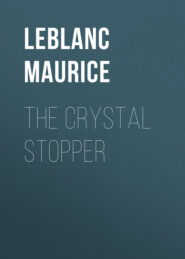По всем вопросам обращайтесь на: info@litportal.ru
(©) 2003-2024.
✖
The Eight Strokes of the Clock
Настройки чтения
Размер шрифта
Высота строк
Поля
Now it was precisely this deduction which was drawn and was being weighed and discussed during the few days that preceded the 18th of October, when logic demanded the performance of yet another act of the abominable tragedy. And it was only natural that, on the morning of that day, Prince Rénine and Hortense, when making an appointment by telephone for the evening, should allude to the newspaper-articles which they had both been reading:
"Look out!" said Rénine, laughing. "If you meet the lady with the hatchet, take the other side of the road!"
"And, if the good lady carries me off, what am I to do?"
"Strew your path with little white pebbles and say, until the very moment when the hatchet flashes in the air, 'I have nothing to fear; he will save me.' He is myself … and I kiss your hands. Till this evening, my dear."
That afternoon, Rénine had an appointment with Rose Andrée and Dalbrèque to arrange for their departure for the States.[1 - See The Tell-tale Film (#x3_pgepubid00009).] Before four and seven o'clock, he bought the different editions of the evening papers. None of them reported an abduction.
At nine o'clock he went to the Gymnase, where he had taken a private box.
At half-past nine, as Hortense had not arrived, he rang her up, though without thought of anxiety. The maid replied that Madame Daniel had not come in yet.
Seized with a sudden fear, Rénine hurried to the furnished flat which Hortense was occupying for the time being, near the Parc Monceau, and questioned the maid, whom he had engaged for her and who was completely devoted to him. The woman said that her mistress had gone out at two o'clock, with a stamped letter in her hand, saying that she was going to the post and that she would come back to dress. This was the last that had been seen of her.
"To whom was the letter addressed?"
"To you, sir. I saw the writing on the envelope: Prince Serge Rénine."
He waited until midnight, but in vain. Hortense did not return; nor did she return next day.
"Not a word to any one," said Rénine to the maid. "Say that your mistress is in the country and that you are going to join her."
For his own part, he had not a doubt: Hortense's disappearance was explained by the very fact of the date, the 18th of October. She was the seventh victim of the lady with the hatchet.
"The abduction," said Rénine to himself, "precedes the blow of the hatchet by a week. I have, therefore, at the present moment, seven full days before me. Let us say six, to avoid any surprise. This is Saturday: Hortense must be set free by mid-day on Friday; and, to make sure of this, I must know her hiding-place by nine o'clock on Thursday evening at latest."
Rénine wrote, "THURSDAY EVENING, NINE O'CLOCK," in big letters, on a card which he nailed above the mantelpiece in his study. Then at midday on Saturday, the day after the disappearance, he locked himself into the study, after telling his man not to disturb him except for meals and letters.
He spent four days there, almost without moving. He had immediately sent for a set of all the leading newspapers which had spoken in detail of the first six crimes. When he had read and reread them, he closed the shutters, drew the curtains and lay down on the sofa in the dark, with the door bolted, thinking.
By Tuesday evening he was no further advanced than on the Saturday. The darkness was as dense as ever. He had not discovered the smallest clue for his guidance, nor could he see the slightest reason to hope.
At times, notwithstanding his immense power of self-control and his unlimited confidence in the resources at his disposal, at times he would quake with anguish. Would he arrive in time? There was no reason why he should see more clearly during the last few days than during those which had already elapsed. And this meant that Hortense Daniel would inevitably be murdered.
The thought tortured him. He was attached to Hortense by a much stronger and deeper feeling than the appearance of the relations between them would have led an onlooker to believe. The curiosity at the beginning, the first desire, the impulse to protect Hortense, to distract her, to inspire her with a relish for existence: all this had simply turned to love. Neither of them was aware of it, because they barely saw each other save at critical times when they were occupied with the adventures of others and not with their own. But, at the first onslaught of danger, Rénine realized the place which Hortense had taken in his life and he was in despair at knowing her to be a prisoner and a martyr and at being unable to save her.
He spent a feverish, agitated night, turning the case over and over from every point of view. The Wednesday morning was also a terrible time for him. He was losing ground. Giving up his hermit-like seclusion, he threw open the windows and paced to and fro through his rooms, ran out into the street and came in again, as though fleeing before the thought that obsessed him:
"Hortense is suffering.... Hortense is in the depths.... She sees the hatchet.... She is calling to me.... She is entreating me.... And I can do nothing...."
It was at five o'clock in the afternoon that, on examining the list of the six names, he received that little inward shock which is a sort of signal of the truth that is being sought for. A light shot through his mind. It was not, to be sure, that brilliant light in which every detail is made plain, but it was enough to tell him in which direction to move.
His plan of campaign was formed at once. He sent Adolphe, his chauffeur, to the principal newspapers, with a few lines which were to appear in type among the next morning's advertisements. Adolphe was also told to go to the laundry at Courbevoie, where Mlle. Covereau, the second of the six victims, had been employed.
On the Thursday, Rénine did not stir out of doors. In the afternoon, he received several letters in reply to his advertisement. Then two telegrams arrived. Lastly, at three o'clock, there came a pneumatic letter, bearing the Trocadéro postmark, which seemed to be what he was expecting.
He turned up a directory, noted an address–"M. de Lourtier-Vaneau, retired colonial governor, 47 bis, Avenue Kléber"–and ran down to his car:
"Adolphe, 47 bis, Avenue Kléber."
He was shown into a large study furnished with magnificent book-cases containing old volumes in costly bindings. M. de Lourtier-Vaneau was a man still in the prime of life, wearing a slightly grizzled beard and, by his affable manners and genuine distinction, commanding confidence and liking.
"M. de Lourtier," said Rénine, "I have ventured to call on your excellency because I read in last year's newspapers that you used to know one of the victims of the lady with the hatchet, Honorine Vernisset."
"Why, of course we knew her!" cried M. de Lourtier. "My wife used to employ her as a dressmaker by the day. Poor girl!"
"M. de Lourtier, a lady of my acquaintance has disappeared as the other six victims disappeared.
"What!" exclaimed M. de Lourtier, with a start. "But I have followed the newspapers carefully. There was nothing on the 18th of October."
"Yes, a woman of whom I am very fond, Madame Hortense Daniel, was abducted on the 17th of October."
"And this is the 22nd!"
"Yes; and the murder will be committed on the 24th."
"Horrible! Horrible! It must be prevented at all costs...."
"And I shall perhaps succeed in preventing it, with your excellency's assistance."
"But have you been to the police?"
"No. We are faced by mysteries which are, so to speak, absolute and compact, which offer no gap through which the keenest eyes can see and which it is useless to hope to clear up by ordinary methods, such as inspection of the scenes of the crimes, police enquiries, searching for finger-prints and so on. As none of those proceedings served any good purpose in the previous cases, it would be waste of time to resort to them in a seventh, similar case. An enemy who displays such skill and subtlety would not leave behind her any of those clumsy traces which are the first things that a professional detective seizes upon."
"Then what have you done?"
"Before taking any action, I have reflected. I gave four days to thinking the matter over."
M. de Lourtier-Vaneau examined his visitor closely and, with a touch of irony, asked:
"And the result of your meditations …?"
"To begin with," said Rénine, refusing to be put out of countenance, "I have submitted all these cases to a comprehensive survey, which hitherto no one else had done. This enabled me to discover their general meaning, to put aside all the tangle of embarrassing theories and, since no one was able to agree as to the motives of all this filthy business, to attribute it to the only class of persons capable of it."
"That is to say?"
"Lunatics, your excellency."
M. de Lourtier-Vaneau started:
"Lunatics? What an idea!"
"M. de Lourtier, the woman known as the lady with the hatchet is a madwoman."
"But she would be locked up!"
"We don't know that she's not. We don't know that she is not one of those half-mad people, apparently harmless, who are watched so slightly that they have full scope to indulge their little manias, their wild-beast instincts. Nothing could be more treacherous than these creatures. Nothing could be more crafty, more patient, more persistent, more dangerous and at the same time more absurd and more logical, more slovenly and more methodical. All these epithets, M. de Lourtier, may be applied to the doings of the lady with the hatchet. The obsession of an idea and the continual repetition of an act are characteristics of the maniac. I do not yet know the idea by which the lady with the hatchet is obsessed but I do know the act that results from it; and it is always the same. The victim is bound with precisely similar ropes. She is killed after the same number of days. She is struck by an identical blow, with the same instrument, in the same place, the middle of the forehead, producing an absolutely vertical wound. An ordinary murderer displays some variety. His trembling hand swerves aside and strikes awry. The lady with the hatchet does not tremble. It is as though she had taken measurements; and the edge of her weapon does not swerve by a hair's breadth. Need I give you any further proofs or examine all the other details with you? Surely not. You now possess the key to the riddle; and you know as I do that only a lunatic can behave in this way, stupidly, savagely, mechanically, like a striking clock or the blade of the guillotine...."











